【回看】全球视野下翻译传译认知国际研讨会暨中国翻译认知研究会第六届大会
人工智能时代口译技术应用研究-王华树
新书推荐
语言智能在汉语作文评测中的应用-周建设
直播推荐
直播:4月20日-21日
《2019 CATIC》专题栏目
International Symposium on Translation, Interpreting and Cognition in a Global Vision & the 6th CATIC Conference
A global vision is necessary to translation researchers in the process of globalization, which is a multi-faceted, multi-perspective and multi-dimensional comprehensive thinking capacity. In the global vision, we need to develop our studies on an international level to meet the requirements of opportunities and challenges of diversification. China Association for Translation, Interpreting and Cognition (CATIC) has successfully hosted the 1st session organized by Fudan University (China), the 2nd session by Ningbo Institute of Technology, Zhejiang University (China), the 3rd session by Henan University of Technology (China), and the 4th session by Hokkaido University (Japan) respectively, and will host the 5th session organized by City University of Hongkong. In order to further promote translation, interpreting, cognition studies and academic exchanges, CATIC will hold the International Symposium on Translation, Interpreting and Cognition in a Global Vision & the 6th CATIC Conference in Shanghai, China on April 19-21, 2019. This international conference will be organized by College of Foreign Languages and Literature, Fudan University, co-organized by Shanghai University of Electronic Power in China, supported by TTV.
Ⅰ. Theme
International Symposium on Translation, Interpreting, Cognition and Their Interdisciplinary in a Global Vision.
This symposium covers keynote speeches, editors-in-chief forum and parallel sessions. Those who have submitted conference papers will obtain international conference certificates. The excellent papers will be published.
Ⅱ. Main topics
▲ The leading frontiers and trends of theoretical studies on cognitive translation
▲ The theoretical and empirical studies of cognitive translation
▲The theoretical and empirical studies of cognitive interpreting
▲ The theory and application of rhetoric translation studies
▲ Translation studies on the traditional Chinese cultural works
▲ Translators and interpreters’ training
▲ Translation, interpreting education and teaching
▲ Machine translation & information technology
▲Translation,interpreting, cognition and interdisciplinary studies
▲ Translation, interpreting, cognitive process studies
▲ Other related research topics
Ⅲ. Invited keynote speakers
Overseas Speakers
Arnt JAKOBSEN:
·President of European Society for Translation Studies;
·Founder of Translog;
·Expert of translation process studies
Caiwen WANG:
· Translation and Interpreting expert at the University of Westminster, UK
Daniel GILE:
·Professor Emeritus at Universite Paris 3 Sorbonne Nouvelle
·Author of Basic Concepts and Models for Interpreter and Translator training
·Founder of the CIRIN network
·Founding member and former president of the European Society for Translation Studies
Gavin ADAIR:
·Former professor at the City University of New York;
·External expert, College of Foreign Languages and Literature, Fudan University
Jie SHI:
·National Key Discipline Leader of the University of Electro-communications, Tokyo, Japan;
·Distinguished Professor;
·Doctoral Supervisor
John MAHER:
· Multilingual translation research expert;
·One of the founders of the Japanese Society of Sociolinguistics;
·Professor at Waseda University, Japan
Jeff KLEIN:
·Ph.D., University of Michigan;
·External expert, College of Foreign Languages and Literature, Fudan University
Miles LINK:
·External expert, College of Foreign Languages and Literature, Fudan University
Domestic Speakers
CHANG Shaohua:
·Deputy editor and editorial director of the editorial department of China Foreign Languages;
·Executive director of China Association for Translation, Interpreting and Cognition (CATIC)
CHEN Jianlin:
·Professor, Shanghai International Studies University;
·Doctoral Supervisor;
·Adjunct research professor of Research of Foreign Language Strategies Center;
·Deputy director of China CALL;
·Deputy editor, Technology Enhanced Foreign Language Education;
·Editor-in-Chief, Language Policy and Language Education
CHEN Zhangyun:
·Professor, Beijing Foreign Studies University;
·Leading academic leader in English language and literature;
·Director, the editorial department of Foreign Language Teaching and Research;
FU Jingmin:
·Professor, School of Foreign Languages, Shanghai University;
·Doctoral supervisor;
·Executive Editor-in-Chief, Shanghai Journal of Translators
HAN Yan:
·Head of Neurology Department, Yueyang Hospital of Integrated Traditional Chinese and Western Medicine, Shanghai University of Traditional Chinese Medicine;
·Professor;
·Doctoral supervisor
KANG Zhifeng:
·Professor, College of Foreign Languages and Literature, Fudan University;
·Doctoral Supervisor;
·President of China Association for Translation, Interpreting and Cognition (CATIC);
·Vice President of China Association for Ecological Translation, and Cognitive Translation;
·Vice President of China Rhetoric Society;
·Editor-in-Chief, Translation Research and Teaching.
LI Defeng:
·Director of Center for Studies of Translation, Interpreting and Cognition in University of Macao;
·Professor of University of Macao;
·Doctoral Supervisor;
·Director of World Interpreter and Translator Training Association (WITTA);
·Adviser of the publishing Committee of European Society for Translation Studies;
·Vice President of China Association for Translation, Interpreting and Cognition (CATIC);
·Distinguished expert for Shanghai 1,000 Talents Plan
LI Yashu:
·Honorary President of China Association for Translation, Interpreting and Cognition;
·Senior Translator of Translators Association of China;
·Consultant, Chinese Science & Technology Translators Journal;
·Senior Expert of Chinese Academy of Sciences
LIANG Chaoqun:
·Professor of East China Normal University;
·Doctoral supervisor;
·Director, the editorial department of Foreign Language Learning Theory and Practice;
·Vice President of China Association for Translation, Interpreting and Cognition (CATIC)
QIU Donglin:
·Former deputy dean, Professor, Doctoral supervisor of College of Foreign Languages and Literature, Fudan University;
·Advisor of China Association for Translation, Interpreting and Cognition (CATIC)
WANGHeping:
·Professor, Xi’an International Studies University;
·Executive Editor-in-Chief, Foreign Language Education
WEN Xu:
·CPC Party Secretary of College of International Studies, Southwest University;
·Professor of Southwest University;
·Doctoral Supervisor;
·State Council Expert for Special Allowance;
·President of China Association for Ecological Translation and Cognitive Translation;
·Vice President of China Association for Translation, Interpreting and Cognition (CATIC);
·Vice President of China Pragmatics Association
XIONG Xueliang:
·Professor, College of Foreign Languages and Literature, Fudan University;
·Doctoral supervisor;
·Expert in cognitive linguistics research
YANG Ping:
·Director of Translators Association of China;
·Vice Editor-in-Chief, Chinese Translators Journal;
·Vice Director and Secretary General of Translation Theory and Teaching Commission Affiliated to Translators Association of China
YAN Xiu:
Subject Leader of the Translation MA Program in the Department of Linguistics and Translation at City University of Hong Kong;
·Doctoral supervisor;
·Academic Leader in Interpreting
ZHAO Yongqing:
·Professor, School of English Studies, Dalian University of Foreign Languages;
·Editor-in-Chief, Foreign Languages and Their Teaching
In addition, there are some domestic experts (Professor Jiang Meng, Professor Lu Zhi, Professor Wang Jianhua, Professor Wang Jiankai, Professor Pan Weimin, Professor Wang Xiaolu, Professor Zhu Zhenwu, etc.) and some editors-in-chief of core journals in foreign languages.
Ⅳ. Schedule
Registration: 8:30-23:00, Friday, April 19, 2019 ;
Yanyuan Hotel (No. 270 Zhengtong Road, Yangpu District, Shanghai)
Tel: 86-21-65115121
Board meeting: 19:30, April 19, 2019 (Friday);
Conference: April 20-21, 2019
April 20: opening ceremony,keynote speeches,parallel sessions
April 21:keynote speeches,parallel sessions, closing ceremony,
Editorial forum: 19:30, April 20, 2019
Editors-in-chief from such core journals as Foreign Language Teaching and Research, Foreign Language Education, Chinese Translators Journal, Foreign Languages in China, Foreign Language Learning Theory and Practice, Foreign Languages and Their Teaching, Computer-Assisted Foreign Language Education, Chinese Science and Technology Translators Journal, Shanghai Journal of Translators, Translation Research and Teaching will be present.
V. Symposium Venue
Fudan University (Handan Campus)
Address: Guanghua Tower, 220 Handan Road, Yangpu District, Shanghai, China
Ⅵ. About the Fee
Registration fee of RMB 1000 (RMB 500 for postgraduates) will be charged for each participant, including meals and material fees, but not transportation and accommodation costs.
Payment method
Please transfer the registration fee to the following account before March 1, 2019:
Name: Fudan University; Bank: Agricultural Bank of China Shanghai Xiangyin Sub-branch, Account number: 033267-08017003441, Taxpayer identification number: 12100000425006117P, Address: No. 220, Handan Road, Yangpu District, Shanghai, Tel: (021)-65648300.
Please send the transfer information to the organizing committee’s mailbox(CATIC2019@163.com) after the transfer. You can receive your reimbursement invoice on April 19th, 2019 if you transfer your accounts before March 1st, 2019.
VII. Registration method
Academic papers related to the topics above are all welcomed. Participants are required to send English or Chinese titles and abstracts in the form of mail attachment to the organizing committee’s mailbox: CATIC2019@163.com. The deadline for paper submission is March 1, 2019. A letter of paper acceptance notification will be sent by the organizing committee (Participants who do not submit papers, please also fill in the form).
VIII. Contact
Contact: Ms. Shao Juan13371186325; Ms. Shi Ying 13162052275; Ms. LianXiaoying 86-21-65642765
Conference committee mailbox: CATIC2019@163.com
The Organizing Committee of International Symposium on Translation, Interpreting and Cognition in a Global Vision & the 6th CATIC Conference
Host: China Association for Translation, Interpreting and Cognition (CATIC)
Organizer: College of Foreign Languages and Literature,Fudan University
Co-organizer: College of Foreign Languages, Shanghai University of Electronic Power
Supporter: TTV
September, 2018
Contact:
Ms. Shao Juan 13371896325
Ms. Shi Ying 13162052275
Ms. LianXiaoying86-21-65642765
catic2019@163.com;
Download link for application form:
https://pan.baidu.com/s/18HhZOdNdOl46alp3F5Q8bA
Password: h0m8
|
2019 年 4 月 19 日(星期五),地点:复旦大学燕园宾馆(Location: Yanyuan Hotel)(政通路 270 号 No.270 Zhengtong Road) |
|
|
13:30-22:00 |
燕园宾馆大堂设立会务接待处,登记与接待嘉宾入住 |
|
18:45-21:00 |
中国翻译认知研究会理事会会议(Board meeting of directors)(光华楼西辅楼 104) 主持人:秘书长潘卫民教授; |
|
2019 年 4 月 20 日(星期六),地点:复旦大学光华楼东辅楼 202 吴文政报告厅 |
|
|
一、开幕式 Opening Ceremony(光华楼 Guanghua Building) |
|
|
8:30-8:35 |
中国翻译认知研究会会长、复旦大学外文学院博士生导师康志峰教授主持并宣布大会隆重开幕 康志峰教授介绍出席会议的主要嘉宾 |
|
8:35-8:40 |
复旦大学外文学院副院长卢丽安教授致欢迎词 |
|
8:40-8:45 |
中国翻译认知研究会名誉会长、中国科学院资深翻译家李亚舒教授向大会致贺词 |
|
8:45-8:50 |
复旦大学出版社总经理李华教授致辞 |
|
8:50-8:55 |
中国翻译认知研究会秘书长、上海电力大学外国语学院院长潘卫民教授致辞 |
|
8:55-9:00 |
中国翻译认知研究会常务理事、西北师范大学外语学院院长曹进教授代表新入会的理事会成员致辞 |
|
9:00-9:05 |
北京东方正龙数字技术公司张燕威总经理致辞 |
|
9:00-9:30 |
开幕式合影(光华楼前)、茶歇 |
|
二、主旨发言(吴文政报告厅)(评议专家评议不超过 3 分钟) |
||
|
9:30-10:00 |
发言人:Professor Arnt Jakobsen 题目:Translation process research and the new construction of meaning |
主持人:李丽青教授评议专家:詹成教授 |
|
10:00-10:25 |
发言人:康志峰教授 题目:A Study of Perception in Simultaneous Visual Interpreting from the Perspective of Cognitive Neuroscience |
主持人:常少华主任 评议专家:鲍晓英教授 |
|
10:25-10:50 |
发言人:陈坚林教授 题目:A Historical View on the Translators’ Cognitive Process Reflected in the English Grammatical Terms Translation in China |
主持人:陈宏俊教授 评议专家:李正栓教授 |
|
10:50-11:15 |
发言人:王建华教授 |
主持人:唐斌教授 |
|
|
题 目 : IPR Cognitive-theory Construction and AI Interpreting |
评议专家:刘芹教授 |
|
11:15-11:40 |
发言人:韩燕教授 题目:认知障碍失语 |
主持人:韩戈玲教授 评议专家:王小潞教授 |
|
11:40-12:05 |
发言人:鄢秀教授 题目:口译课堂中的外语焦虑问题:中法本科、硕士班之调查 |
主持人:桂清扬教授 评议专家:胡安江教授 |
|
三、认知与大数据工作坊(光华楼西辅楼 205) |
||||
|
13:30-14:00 |
产学研结合的愿景与实践 |
主持人:王密卿教授 主讲人:朱纯深教授、慕媛媛副教授等 |
||
|
14:00-14:15 |
产学研相关议题讨论 |
|||
|
四、分会场发言(光华楼西辅楼)分会场总负责:李正栓教授 |
||||
|
14:00- 17:00 |
第 1 分会场 (西辅楼205,14:15开始) |
主题:认知修辞翻译 |
||
|
主持人:陈章云教授、余子龙编辑 |
||||
|
评议专家:李亚舒教授、陈坚林教授、朱纯深教授、邹德艳教授 |
||||
|
第 2 分会场 西辅楼 |
主题:翻译理论与实践 |
|||
|
主持人:胡安江教授、吴迪龙处长 |
||||
|
评议专家:张桂萍教授、章彩云教授、徐翰教授、刘宏伟副院长 |
||||
|
第 3 分会场 西辅楼 |
主题:经典外译与机器翻译 |
|||
|
主持人:刘芹教授、艾朝阳主任 |
||||
|
评议专家:刘祥清教授、李海军教授、韩仲谦教授、王彩文(WANG Caiwen)教授 |
||||
|
第 4 分会场 西辅楼 203 |
主题:翻译理论与实践 |
|||
|
主持人:曹进教授、罗永红副院长 |
||||
|
评议专家:梁超群教授、刘建刚教授、张新玲教授、李丹莉教授 |
||||
|
第 5 分会场 西辅楼 204 |
主题:文化外译 |
|||
|
主持人:焦丹副院长、吴相如教授 |
||||
|
评议专家:桑仲刚教授、余莉教授、李丽教授、陈洁教授 |
||||
|
第 6 分会场 西辅楼 209 |
主题:文学经典翻译 |
|||
|
主持人:俞森林教授、张婷副院长 |
||||
|
评议专家:桑龙扬教授、麻争旗教授、宫英瑞教授、段自力教授 |
||||
|
|
||||
|
第 7 分会场 西辅楼 210 |
主题:翻译述评与文化外译 |
|||
|
主持人:张生祥教授、李喜芬教授 |
||||
|
评议专家:熊学亮教授、席建国教授、李海军教授、陈洁教授 |
||||
|
第 8 分会场 |
主题:修辞翻译与人才培养 |
|||
|
|
西辅楼 301 |
主持人:王刚教授、冷冰冰教授 |
|
|
评议专家:常少华主任、SHI Jie 教授、张顺生教授、范敏教授 |
|||
|
第 9 分会场 西辅楼 302 |
主题:翻译跨学科研究 |
||
|
主持人:朱献珑教授、杨敏教授 |
|||
|
评议专家:王建国教授、段钨金教授、刘东楼教授 |
|||
|
第 10 分会场 西辅楼 303 |
主题:翻译跨学科研究 |
||
|
主持人:于林龙教授、李晓婧教授 |
|||
|
评议专家:韩戈玲教授、刘炜教授、何克勇教授、肖平教授 |
|||
|
第 11 分会场 西辅楼 304 |
主题:翻译认知过程研究 I |
||
|
主持人:刘芳教授、马小梅高工 |
|||
|
评议专家:王小潞教授、倪锦诚教授、万莉教授、陆秀英教授 |
|||
|
第 12 分会场 西辅楼 305 |
主题:应用翻译研究 |
||
|
主持人:万江波教授、王家义教授 |
|||
|
评议专家:唐斌教授、黄缅教授、汤敬安教授、谈政华教授 |
|||
|
第 13 分会场 西辅楼 306 |
主题:翻译认知过程研究 II |
||
|
主持人:张素敏教授、朱燕教授 |
|||
|
评议专家:杨枫教授、李淑华教授、李丽青教授、桂清扬教授 |
|||
|
第 14 分会场 西辅楼 309 |
主题:口译理论与实践 I |
||
|
主持人:王炎强博士、李波博士 |
|||
|
评议专家:詹成教授、鄢秀教授、谌莉文教授、郭敏教授 |
|||
|
第 15 分会场 西辅楼 310 |
主题:口译理论与实践 II |
||
|
主持人:万宏瑜教授、管玉华老师 |
|||
|
评议专家:李德凤教授、张沉香教授、鲍晓英教授、郭敏教授 |
|||
|
17:30-18:30 晚餐(Banquet Dinner) |
|||
|
18:45-21:00 |
主编论坛(光华楼西辅楼 104) |
召集人:康志峰教授主持人:梁超群教授总结人:陈章云教授 发言人(按姓氏拼音):常少华主任、陈坚林教授、陈章云教授、傅敬民教授、康志峰教授、李亚舒教授、梁超群教授、王和平教授、杨枫教授 |
|
|
2019 年 4 月 21 日(星期日),地点:复旦大学光华楼东辅楼 202(Location: Guanghua Building) |
||
|
四、主旨发言(吴文政报告厅)(评议专家评议不超过 3 分钟) |
||
|
8:30-8:55 |
发言人:熊学亮教授 题目:构式基点论的翻译学意义 |
主持人:张焕香教授 评议专家:李秀英教授 |
|
|
|
|
|
8:55-9:20 |
发言人:李德凤教授 题 目 : Translation Process Research: The Sociological Approach |
主持人:于林龙教授评议专家:冯奇教授 |
|
9:20-9:45 |
发言人:Professor SHI Jie 题 目 : The advancement of AI-Assisted Translation: Is it overtaking human translation? |
主持人:藏志勇教授 评议专家:张新玲教授 |
|
9:45-10:10 |
发言人:Dr WANG Caiwen 题目: A Review of Existing Literature and Pedagogic Practice on Directionality of Simultaneous Interpreting from the Cognitive Perspective |
主持人:康响英教授 评议专家:张生祥教授 |
|
10:10-10:20 |
茶歇 |
|
|
10:20-10:45 |
发言人:卢植教授 |
主持人:桑龙扬教授 |
|
|
题 目 : The Effects of |
评议专家:刘振前教授 |
|
|
Conventionality of Metaphor on |
|
|
|
Cognitive Effort Invested in |
|
|
|
Metaphor Translation Process |
|
|
10:45-11:10 |
发言人:Mr. Gavin Adair |
主持人:张沉香教授 |
|
|
题目:The Idea Wants to Remain |
评议专家:张明芳教授 |
|
|
Still, but the Meaning Keeps |
|
|
|
Shifting: Textual Unrealities in the |
|
|
|
Digital World |
|
|
11:10-11:35 |
发言人:傅敬民教授 题目:谈谈无意识翻译现象 |
主持人:张素敏教授 评议专家:潘卫民教授 |
|
11:35-12:00 |
发言人:Dr Miles Link |
主持人:李海军教授 |
|
|
题目:不相往来 : On the |
评议专家:倪锦诚教授 |
|
|
Impossibility of Translating |
|
|
|
Utopias |
|
|
五、闭幕式(吴文正报告厅) |
||
|
12:00-12:05 |
李正栓教授:代表工作坊和十五个分会场总结发言 |
主持人:李亚舒教授 |
|
12:05-12:10 |
王建开教授:大会学术总结 |
主持人:李德凤教授 |
|
12:10-12:15 |
唐敏社长:产学研代表总结 |
主持人:刘振前教授 |
|
12:15-12:20 |
下届承办方代表致辞会旗交接 |
主持人:陈章云教授 |
|
12:20-12:25 |
会长康志峰教授大会总结发言 |
主持人:潘卫民教授 |
|
12:25-13:30 |
午餐(Lunch Break)后离会 |
|
Conference Agenda
|
April 19, 2019(Friday); Location: Yanyuan Hotel |
|
|
13:00-22:00 |
The conference reception is set up in Yanyuan Hotel lobby for the registration and guests reception |
|
18:45-21:00 |
Board Meeting of CATIC (Room 104, East Part of Building, Guanghua Building) Moderator: Secretary General of CATIC Pan Weimin; Speaker: President Kang Zhifeng, Honorary President Li Yashu, etc. |
|
April 20, 2019 (Saturday), Location: RM. 202 Wu Wenzheng Hall, East Part of Building, Guanghua Building |
|
|
I. Opening Ceremony(Guanghua Building) |
|
|
8:30-8:35 |
Host and Announce the opening by Professor Kang Zhifeng, Introduce the main guests attending the meeting by Professor Kang Zhifeng |
|
8:35-8:40 |
Professor Lu Lian, Vice Dean of College of Foreign Languages and Literature, Fudan University makes a welcome speech |
|
8:40-8:45 |
Professor Li Yashu, Honorary President of CATIC and Senior Translator of the Chinese Academy of Sciences, delivers a welcome speech |
|
8:45-8:50 |
Professor Li Hua, manager of Fudan University Press, makes a speech |
|
8:50-8:55 |
Professor Pan Weimin, Secretary General of CATIC, Dean of School of Foreign Languages, Shanghai University of Electric Power, delivers a speech |
|
8:55-9:00 |
Professor Cao Jin, Excutive Director of CATIC, Dean of College of Foreign Languages and Literature, Northwest Normal University, delivers a speech on behalf of new CATIC members |
|
9:00-9:05 |
Mr Zhang Yanwei, manager of Beijing Colink Digital Technology Co.,Ltd, delivers a speech |
|
9:05-9:30 |
Group photo (location: in front of Guanghua Building) and Tea break |
|
II. Keynote Speeches (Wu Wenzheng Lecture Hall) |
||
|
9:30-10:00 |
Speaker:Professor Arnt Jakobsen |
Moderator: Professor Victoria LEI Commentator: Professor Zhan Cheng |
|
10:00-10:30 |
Speaker:Professor Kang Zhifeng |
Moderator: Director Chang Shaohua Commentator: Professor Bao Xiaoying |
|
10:30-11:00 |
Speaker:Professor Chen Jianlin |
Moderator: Professor Chen Hongjun Commentator: Professor Li Zhengshuan |
|
11:00-11:30 |
Speaker:Professor Wang Jianhua |
Moderator: Professor Liu Xiangqing |
|
|
|
Commentator: Professor Liu Qin |
|
11:30-12:00 |
Speaker:Professor Han Yan |
Moderator: Professor Han Geling Commentator: Professor Wang Xiaolu |
|
12:00-12:30 |
Speaker:Professor Yan Xiu |
Moderator: Professor Gui Qingyang Commentator: Professor Hu Anjiang |
12:30-13:30 Lunch
|
III. Workshop: Cognition and Big Data (East Part of Building, Guanghua Building) |
|||
|
13:30-14:00 |
IUR: Prospect and Practice |
Moderator: Professor Wang Miqing Speakers: Professor Zhu Chunshen & Associative Professor Mu Yuanyuan |
|
|
14:00-14:15 |
IUR: Discussion |
||
|
IV. Parallel Sessions (West Part of Guanghua Building) |
|||
|
13:30-17:00 |
Parallel Sessions |
||
|
17:30-18:30 Banquet Dinner |
|||
|
18:45-21:00 |
Editorial Forum (Room 104, East Part of Building, Guanghua Building) |
Convener: Professor Kang Zhifeng Moderator: Professor Liang Chaoqun Summary: Professor Chen Zhangyun Speakers: Director Chang Shaohua, Professor Chen Jianlin, Professor Chen Zhangyun, Professor Fu Jingmin, Professor Kang Zhifeng, Professor Li Yashu, Professor Liang Chaoqun, Professor Wang Heping, Professor Yang Feng |
|
|
April 21, 2019 (Sunday), Location: Guanghua Building |
||
|
V. Keynote Speeches (Wu Wenzheng Lecture Hall) |
||
|
8:30-8:55 |
Speaker: Professor Xiong Xueliang |
Moderator: Professor Zhang Huanxiang Commentator: Professor Li Xiuying |
|
8:55-9:20 |
Speaker: Professor LI Defeng |
Moderator: Professor Yu Linlong Commentator: Professor Feng Qi |
|
9:20-9:45 |
Speaker: Professor SHI Jie |
Moderator: Professor Zang Zhiyong Commentator: Professor Zhang Xinling |
|
9:45-10:10 |
Speaker: Dr WANG Caiwen |
Moderator: Professor Kang Xiangying Commentator: Professor Zhang Shengxiang |
|
10:10-10:20 |
Tea break |
|
|
10:20-10:45 |
Speaker:Professor Lu Zhi |
Moderator: Professor Sang |
|
|
|
Longyang Commentator: Professor Zhou Tongquan |
|
10:45-11:10 |
Speaker: Mr. Gavin Adair |
Moderator: Professor Ma Yumei Commentator: Professor Li Defeng |
|
11:10-11:35 |
Speaker: Professor Fu Jingmin |
Moderator: Professor Zhang Sumin Commentator: Professor Pan Weimin |
|
11:35-12:00 |
Speaker: Dr Miles Link |
Moderator: Professor Li Haijun Commentator: Professor Ni Jincheng |
|
VI. Closing Ceremony (Wu Wenzheng Lecture Hall) |
||
|
12:00-12:05 |
Professor Li Zhengshuan’s summary of the Parallel Sessions and Workshop |
Moderator: Professor Li Yashu |
|
12:05-12:10 |
Professor Wang Jiankai’s academic summary |
|
|
12:10-12:15 |
Chair Tangmin’s summary for IUR |
Moderator: Professor Liu Zhenqian |
|
12:15-12:20 |
Speech by the host next year and transferring ceremony of association flag |
Moderator: Professor Chen Zhangyun |
|
12:20-12:25 |
President Kang Zhifeng’s summary of the conference |
Moderator: Professor Pan Weimin |
|
12:25-13:30 |
Lunch |
|
Keynote Speakers: Introduction & Abstracts
1. Professor Arnt Lykke Jakobsen
Arnt Lykke Jakobsen, President of the European Society for Translation Studies (EST), is the Professor Emer. of Translation and Translation Technology at Copenhagen Business School (CBS). In 1995 he invented the keylog software program Translog. In 2005 he established CRITT, the CBS Center for Research and Innovation in Translation and Translation Technology, which he directed until his retirement at the end of 2013. His main focus of research has been on developing and exploiting a methodology for translation process research using keylogging and eyetracking. He was CETRA Chair Professor in 2014. In 2016 he was selected President of the European of Society for Translation Studies (EST).
Translation process research and the new construction of meaning
Translation process research (TPR) has been said to be in need of being reembedded in a new conceptual and methodological framework (Muñoz ed. 2016). The main reason for this is that meaning has been found or claimed to be ‘4EA’: embodied, embedded, enacted, extended, and affective. The further claim is that traditional TPR (Jakobsen 2017), using keylogging, eyetracking and retrospective think aloud in lab-oriented experiments, is unable to capture the complexity, concreteness and situatedness of this new construction of meaning. In the new construction, cognition and meaning are not only in our heads, but in our bodies or even in networks (Risku and Windhager 2013). The kind of translation that is done in a lab is artificial and ecologically invalid, it has been claimed. Real translation is best studies in professional translation workplaces (Ehrensberger-Dow et al 2015), and the best method to study translation here is by using anthropological field study methodology.
While much of this criticism carries considerable conviction, there is still much to be said in favour of experimental, process-oriented work. It is not yet clear how field-study methodology or actor network theory will enhance either our understanding of the dependence of human cognition on brain, body, environment, situation and technology, or will reveal how these factors impact on translators’ cognition and decision making.
A case will be made for claiming that translation exists in many places, is equally real in them all, should be studied in them all, and can be relevantly studied with an array of different methodologies.
References
Ehrensberger-Dow, M., Englund Dimitrova, B., Hubscher-Davidson, S., & Norberg, U. (Eds.) (2015)
Describing Cognitive Processes in Translation. Amsterdam/Philadelphia: Benjamins.
Jakobsen, A. L. (2017) Translation Process Research. In Schwieter, J. W. & Ferreira, A. (Eds.) The Handbook of Translation and Cognition. Hoboken NJ: Wiley Blackwell, pp. 21-49.
Muñoz Martín, R. (Ed.) (2016). Reembedding Translation Process Studies. Amsterdam, The Netherlands/Philadelphia, PA: Benjamins.
Risku, H. and Windhager, F. (2013) Extended translation. A sociocognitive research agenda. Target 25 (1), 33-45.
2. 康志峰教授
复旦大学外国语言文学学院教授,博士,博士生导师,中国翻译认知研究会会长,《翻 译研究与教学》主编,中国修辞学会副会长,中国生态翻译和认知翻译研究会副会长,中国 语言教育研究会常务理事,中国教育语言学研究会常务理事,中国翻译协会专家会员,全国 应用翻译与教学文库专家委员会委员。任国家社科项目以及省部级社科项目盲审专家、美国 科学出版集团(Science Publishing Group)应用语言学与翻译学国际期刊(International Journal of Applied Linguistics and Translation)等 3 家期刊,国内 5 家外语名刊口译学研究、翻译学研究、应用语言学等稿件盲审专家和期刊编委。研究方向:口译理论与实践(口译学、口译认 知心理学)、翻译学、应用语言学等。曾在美国马里兰圣玛丽大学教学,访问过美国的哈佛 大学、麻省理工学院、乔治敦大学,加拿大的多伦多大学,英国的剑桥大学,波兰的弗罗茨 瓦夫大学,澳大利亚的墨尔本大学、悉尼大学,南非的开普敦大学,古巴的哈瓦那大学、香 港大学、香港中文大学,台湾大学、台湾师范大学等多所大学并做学术报告。在美国、加拿 大、英国、法国、瑞士、列支敦士登、澳大利亚、南非、埃及、阿联酋、马来西亚、泰国、新加坡、越南、柬埔寨等,以及国内的财富论坛、远程教育、花卉博览会等做过多次同声传 译、交替传译、联络口译等。获部级奖项 2 项,卡西欧奖 10 项。担任校级精品课程和上海市级重点课程英语口译的负责人。国家人文社科项目、教育部人文社科项目、省级人文社科 项目等评审专家,主持国家项目、省部级研究项目等 10 余项。在 International Journal of Language and Linguistics, Journal of Literature and Art Studies 等国际期刊,《外语与外语教学》、
《外语教学》、《中国外语》、《外语教学理论与实践》、《外语研究》、《外语界》、《外语电化教学》等国内外期刊发表期刊论文 100 多篇,出版专著、教材等 50 多部。
Zhifeng Kang, Ph. D. in Interpreting Studies and Practice, Doctoral Supervisor, is Professor of Interpreting Studies in College of Foreign Languages and Literatures at Fudan University. He is President of China Association for Translation, Interpreting and Cognition (CATIC), Editor-in-chief of Translation Research and Teaching, Vice President of China Rhetoric Association (CRA),Vice President of China Association of Ecological Translation and Cognitive Translation (CAETCT), Executive Director of China Association of Language & Education (CALE), Expert Member of Translators Association of China (TAC), and Expert Member of China Theory and Teaching of Applied Translation Council (CTTATC). He is a blind reviewer of research programs of national level and ministry level. He is a blind reviewer and an editorial member of three international journals like International Journal of Applied Linguistics and Translation affiliated to Science (SCI) PG in USA, a blind reviewer of five China’s famous foreign journals. His research fields include Interpreting Studies and Practice (Cognitive Psychology of Interpretation, Interpreting Theory and Practice), Translation Studies, Applied Linguistics etc. He has ever taught translation studies at St. Mary’s College of Maryland in America. He has visited and lectured for the scholars at the following universities such as Harvard University, St. Mary’s College of Maryland in USA, University of Toronto in Canada, Cambridge University in UK,
University of Melbourne, University of Sydney in Australia, University of Cape Town in the Republic of South Africa, University of Havana in Cuba, University of Hong Kong, Chinese University of Hong Kong, National Taiwan Normal University, National Taiwan University and so on. He has obtained 2 awards at provincial and ministerial level and 10 CASIO awards. The leader of Excellent Course of English Interpreting at university-level and Important Course of English Interpreting at municipal level. The leader of Interpreting Course at Fudan University. He is an expert of National Social Science Fund Programs of China (NSSFPC), even Ministerial and Provincial ones. He has taken charge of more than 10 national and ministry level research programs. He has published over 100 papers and 50 monographs and textbooks in International Journal of Language and Linguistics, Journal of Literature and Art Studies, Foreign Languages and Their Teaching, Foreign Language Teaching, Foreign Languages in China, Foreign Language Learning Theory and Practice, Foreign Languages Research, Foreign Language World, Technology Enhanced Foreign Language Education and so on.
A Study of Perception in Simultaneous Visual Interpreting from the Perspective of Cognitive Neuroscience
This study, through investigating student interpreters’ perception in Simultaneous Visual Interpreting (SVI) from the Perspective of Cognitive Neuroscience, aims to make them have better performance in SVI and achieve better interpreting products. The method of this research is that of empirical studies based upon anatomy and perceptual analysis of linguistic processing in SVI. The research has found the internal factors like long-term memory, attention, psychological factors, emotional factors etc., and the external factors like sound, light, electronic powers and so on that affect student interpreters’ perception in SVI. And eventually this research gives the strategies to solve the issues of student interpreters’ perception in SVI from the source language (SL). This study has some positive implications to student interpreters in SVI so as to make them have better perfomace in SVI and achieve better interpreting results.
3. 陈坚林教授
Dr. Chen Jianlin is a Professor at Shanghai International Studies University (SHISU) where he heads the research program of graduate studies in theory and practice of Foreign Language Education and Language Educational Policy. He has an MA. in Descriptive and Applied Linguistics (University of Essex) and a Ph.D. in English Language Education (SHISU). Prof. Chen Jianlin worked on different issues in foreign language education related to curriculum development, education technology, web-based foreign language teaching and learning, teacher development in foreign language education, CALL course design, etc. With a 15-collection TV Program of language education, around 10 books and some 60 articles and book chapters to his credit, Prof. Chen Jianlin has also been Visiting Professor in several universities in China and America. Among his books are: Organization and Management in English Language Education; Theory and Methodology in Foreign Language Teaching Research; The Integration of Computer and Networks into Foreign Language Curriculum. His TV works “English for Primary School Pupils” shown on CCTV 2 (2004-2005) received the 2005 Award of first prize of Best TV Education Program from the China TV Educational Research Association (CTVERA). Since 2012, he is a vice-president of China CALL.
A Historical View on the Translators’ Cognitive Process Reflected in the English
Grammatical Terms Translation in China
This speech, based on the historical cultural and cognitive perspectives of languages development, presents a historical view on the translators’ cognitive process reflected in the English grammatical terms translation in China and its implications on the foreign language translation teaching today. The arguments in the speech are presented in terms of the changes in translators’ cognitive process, majorly covering these issues: (a) the features and functions of traditional Chinese grammar in late Qing dynasty and Early Republican Period; (b) the early introduction of English grammar books through translation into China and its impacts on translators’ cognition of English grammatical terms; and (c) English grammatical terms translation as the triggers on the rapid development of translators’ cognitive process in China. The speech discusses the above issues majorly from the historical cultural and cognitive perspectives, triggering some reflections on the inadequacies of the present languages translation teaching and raising some hot issues for further research.
4. 王建华教授
王建华, 山西师范大学副校长兼外国语学院院长,中国人民大学外国语学院教授,博士生导师。北京师范大学认知心理学博士,兼任中国翻译认知研究会副会长,中国生态翻译与认知翻译研究会副会长,中国外语界面研究会常务理事。 2012 年-2013 年任美国蒙特雷国际研究院高级访问学者,2015 年牛津大学短期访学研究。 主要研究方向:语言认知研究、口译过程认知研究、口笔译理论研究和话语功能认知研究。近年来主持国家社科项目 1 项和
多项省部级科研项目,同时,主持中国人民大学重大科研基金项目和品牌研究项目各 1 项。出版有《口译认知研究》等多部专著。在《中国翻译》、《外语学刊》、《外语与外语教学》、
《上海翻译》和《外语教学与研究》以及《光明日报》(理论版)等期刊发表核心论文数十篇。
IPR Cognitive-theory Construction and AI Interpreting
Abstract: AI interpreting technology develops rapidly with the improvement of interpreting corpus construction, speech recognition and synthesis techniques, self-learning and adaptation technology and neural network system, which in return greatly pushes forward the progress of AI interpreting technology. But, without deep study on human interpreting process, AI interpreting technique can hardly reaches an all-time satisfactory level. This study aims at constructing human IP theory based on cognitive psychology and cognitive linguistics to further AI interpreting ability through analysis of sub-processes of interpreting including understanding, memory, efforts balances and conveying of speeches to make a holistic process study. For each sub-process, supportive cognitive-theories are explored to build a holistic process study strategy to provide a substantial theoretical assistance to AI interpreting studies.
Key words: AI interpreting; human interpreting; Interpreting process research(IPR)
5. 韩燕教授
韩燕,医学博士,留美学者,上海中医药大学附属岳阳医院神经内科主任,教授、主任医师,博士研究生导师,2014 年入选“上海市浦江人才计划”,2011 年入选“国家留学基金委青年骨干教师培养计划”。目前担任中国医师协会神经病学分会全国委员,中国卒中学会青年常务理事,中国卒中学会遗传学分会委员,中国卒中学会新药研发分委会委员,上海医学会神经病学专委会青年委员、脑血管病学组成员,中西医结合学会神经病学分会常务委员, 中国卒中学会上海分会理事,上海市中西医结合学会神经内分泌专委会委员,全军神经内科学专委会脑血管病介入学组委员。
认知障碍失语
主要内容包括经典的语言中枢定位,失语症分类,当代语音和语言的脑内定位模型,认知损害疾病伴随的语言损害四个部分内容。首先,目前在临床诊治及疾病课程教学当中,仍然在神经科医生中广泛使用的语言中枢定位,因为其病灶与失语类型一一对应的模式,便于理解的特点,仍然在临床上占主流地位,故而,第二部分介绍的失语症的分类,在很大程度上,仍然是基于经典语言中枢定位与临床表现的一种分类方式。但是在临床诊疗过程当中, 我们发现,失语并不总是能那么简单地与解剖病损一一对应起来。而随着科技的发展,及脑科学的进步,我们目前发现,我们对失语症、或是说语言中枢的脑内定位的理解,是需要更新的。在今天的讲课中,我们也对当代语音与语言的脑内定位模型做相关介绍。对我们临床医生来讲,认知损害伴随的语言损害非常有意思,在此,也向各位语言学专家做一分享。
6. 鄢秀教授
Dr. Jackie Xiu Yan is Subject Leader of the Translation MA Program in the Department of Linguistics and Translation at City University of Hong Kong. She received her PhD and MEd from the University of Texas at Austin, BA from Shanghai International Studies University. Her research interests include social and affective factors in translation and language learning, corpus-based analysis of translation studies, classical Chinese translation and interpretation. She has published profusely in the fields of translation studies and applied linguistics, including books such as Research on Translator and Interpreter Training: A Collective Volume of Bibliometric Reviews and Empirical Studies on Learner, Cultural Identity and Language Anxiety.
Dr Yan is a dedicated editor of the Chinese Translation Series of Jonathan Spence Works (Translation ed.): Return to Dragon Mountain,Emperor of China: Self-portrait of K’ang-His, Treason by the Book,The Death of Woman Wang,God’s Chinese Son,The Chan’s Great Continent: china in western Minds,The Question of Hu,To Change China: Western Advisers in China 1620-1960,Ts’ao Yin and the K’ang-hsi Emperor: Bondservant and Master,The Memory Palace
of Matteo Ricci. She is also a contributing editor of the renowned Chinese-English Dictionary by Fudan University Press.
鄢秀,香港城市大学翻译及语言学系翻译硕士学科负责人,博士生导师。1998 年毕业于奥斯汀得克萨斯大学,获博士学位。鄢博士长期致力于口笔译教学、二语习得的实证研究以及经典翻译的研究。在 Interpreter and Translator Trainer, Perspectives: Studies in Transtology, Language Learning, Target 等多种 SSCI 及 AHCI 学术刊物发表论文。著作及主编的书籍包括Research on Translator and Interpreter Training: A Collective Volume of Bibliometric Reviews and Empirical Studies on Learner, 《文化认同与语言焦虑》, 史景迁作品中译系列 (《前朝梦忆:张岱的浮华与苍凉》、《康熙:重构一位中国皇帝的内心世界》、《雍正王朝之大义觉迷》、
《王氏之死》、《太平天国》、《大汗之国》、《胡若望的疑问》、《改变中国》、《康熙与曹寅》,
《利玛窦的记忆宫殿》) 等。
口译课堂中的外语焦虑问题: 中法本科、硕士班之调查
近年来口译专业及口译课程的数量呈不断上升趋势,以培养口译人才满足市场的需求。然口译教学的实证研究却仍然滞后,尚未受到应有的重视。譬如口译课堂上的焦虑问题,需要投入更多的研究。焦虑情况普遍存在, 焦虑情绪会对学生产生多方面的影响,导致成绩不够理想。 究其原因,有研究者认为,焦虑的学生被紧张情绪主导,需运用有限的脑力处理与口译任务无关的情绪问题,而无法专注于任务本身。口译是一种高度复杂的认知行为, 要求一心多用(如听说、理解、分析、笔记等)。焦虑情绪会分散学生的注意力,影响上述任务的完成。 外语焦虑便是影响学生课堂口译表现的重要因素之一。目前已有少数研究者在高校口译课程中探索外语焦虑所产生的种种问题,但结果并不理想。需要更多的研究投入, 并借鉴心理学及语言课堂外语焦虑研究的丰硕成果。本研究通过问卷调查和分组焦点访谈的方式,探讨法语专业学生本科与硕士班口译课堂上外语焦虑的成因和可能减轻焦虑的方法, 从不同的侧面研究外语焦虑对学生课堂表现的影响,以丰富现阶段的口译教学研究,提高学生的学习能力和效率。
7. 熊学亮教授
1991 年 6 月获复旦大学文学博士学位,1995 年 5 月晋升教授职称,1997 年 12 月获博士研究生导师资格,2008 年定级为二级教授。现任复旦大学外国语言研究所所长和语言学研究中心主任。曾先后在荷兰、英国、美国、加拿大、法国、德国、日本、新加坡、香港、纳米比亚、澳大利亚等地研修、讲学和参加国际会议。自 1983 年以来在国内外学术杂志上
发表论文 230 多篇,出版著作 17 种。独立承担国家社科等省部级项目 10 项以及复旦大学等其他研究项目 12 项。《现代外语》等 10 多家国内杂志的编委,国际杂志 Chinese Semiotics、Language and Semiotic Studies 等的编委。北大出版社、北外出版社、世图出版社、高教出版社、上海外教出版社等多家出版社语言学丛书的专家委员会成员。担任全国语用学研究会副会长、全国认知语言学研究会副会长、全国语言符号学研究会副会长等,国防科大等 10 多
所大学的兼职教授和客座教授。已指导博士生 34 名、博士后 16 名。获全国宝钢优秀教师奖、
上海市育才奖等奖项 10 多项。
构式基点论的翻译学意义
摘要:与传统语法分层次的解构论不同的是,构式基点论的解读起始点是以小句为出发点的构式。构式首先是语义的部分和整体的语义表达,其中语义的组构关系通过象征连接通达相应的句法结构,句法结构中的语法成分和语法关系的确定,以语义结构为参照点!由于当代类型学的初衷是:句法关系因语义而定、语义关系因构式而定,构式因语言而定,因此激进构式语法在对语句的解读过程中,完全摒弃了对句法关系的考量!本人认为,这种思辨方式给翻译学注入了新鲜血液,对翻译实践具有相当的指导意义。
8. 李德凤教授
世界翻译教育联盟理事长, 中国认知翻译学副会长, 澳门大学翻译学教授,翻译传译认知研究中心主任, 博士生导师。 上海市‘千人计划特聘专家’ 。 先后担任英国伦敦大学翻译研究中心主任、上海交通大学‘星涛湾’讲习教授、山东大学外国语学院院长及翻译学讲座教
授、香港中文大学翻译硕士课程主任等。此外还任欧洲翻译学会出版委员会特聘顾问、中国语料库翻译研究副会长、语料库与跨文化研究副会长、全国翻译专业硕士教学指导委员会学术委员等职。 现接受国际著名学术出版社斯伯林格出版集团邀请,主编斯伯林格《译学前沿》(New Frontiers in Translation Studies)系列丛书。
李德凤教授主要研究方向为翻译学和二语教学,研究兴趣包括实证翻译研究方法论、翻译的心理认知过程、语料库辅助翻译研究、翻译课程设置与教材教法研究、 专业翻译研究
(如商业,金融和新闻等专业文本翻译研究等)、第二语言教学、定性研究方法等。李德凤教授出版近十部专(译)著,如《新闻文本翻译:原则与方法》(香港大学出版社), 《金融文本翻译:理论与应用》(香港大学出版社)、《翻译教学:需求分析与课程设置》(外语教学与研究出版社)),《法律翻译》(中央编译出版社)等。论文多见于 Target: International Journal of Translation Studies、Meta: Translators’ Journal, Interpreter and Translator Trainer、Babel: International Journal of Translation, TESOL Quarterly, International Journal of Applied Linguistics, ATA Chronicle, Perspectives: Studies in Translatology, Translation Quarterly,《外国语》、《中国翻译》等国际国内学术刊物。
Translation Process Research: The Sociological Approach
Translation Process Research, aka TPR, has mainly been used to refer to research efforts made to investigate the cognitive processes of translation, adopting almost exclusively empirical and experimental methods. Such methods include the use of the TAPs, corpus, keylogging, eye tracking, and neuroimaging technologies. This talk proposes to expand the concept to include socio-cultural examination of the translation process, that is the process from the initiation of the translation project, to the authoring of the source text, the commissioning of the translation assignment, the translation process per se, the dissemination of the translated text and the reception/use of the translation text in the target culture. This socio-cultural approach to translation process research pertains particularly to translation studies in the Chinese context, where for example, translation, dissemination and reception of Chinese culture has been of greatest concern and interest to many translators, translation theorists as well as statesmen of the country. Moreover, combining the social-cultural approach with the empirical and experimental approach will also grant us a more integrated approach to translation processes, in which translation participants, the product and the process will all become the object of research and more importantly, the motivating factors behind all decisions made in the translation process will be duly explored in the relevant socio-cultural context.
9. Professor SHI Jie
SHI Jie, Professor of English at the National University of Electro-Communications (UEC), Tokyo, Japan, has been a practitioner and researcher in TESOL, Sociolinguistics, ESP, Translation Studies and Teacher Training for over three decades primarily in China, Japan, Singapore and the US. She is also heavily involved in Curriculum Development and program management at both undergraduate and graduate school levels at UEC Tokyo, Tokyo Institute of Technology and the School of Engineering Science (SES) of Wuhan National Center for Optoelectronics Huazhong University of Science and Technology), China, primarily. She is an active member at several international associations in the above-mentioned areas of research including being the Chair for ESP Kanto of JACET, Vice-President of Asia ESP, an executive board member of CATIC and
China ESP. She also heads the Research Station for Innovative and Global Tertiary English Education (IGTEE) and the Technical English program of UEC Tokyo.
The advancement of AI-Assisted Translation: Is it overtaking human translation?
The research on human translation contributes greatly to the bridging of human societies and the understanding of humanity. In contrast to long and extensive exploration of human translation, the contemporary advancement of Information Technology (IT) at an exponentially speed seems ephemeral. However, the seemingly unrelated Machine Translation (MT) to human translation, is captivating the attention not only researchers and engineers but also public users. The inevitable merging of human mind and mechanical brain is being unveiled, owing to the development of MT. MT is essentially the subject of research for IT researchers and engineers/programmers in the field of Natural Language Processing (NLP) which deals with human languages for the purpose of enabling machines to handle (inclusive of both decode and encode) human languages. Computer software assisting human translation are becoming accessible to professional as well as public users. The popularity of translation software, e.g. Computer-Assisted Translation (CAT) and online translation applications, is mainly brought by its increasing accuracy and certain functions that match or surpass human capacity. This talk intends to display the mechanisms or the engine of MT, especially noting Artificial Intelligence (AI), machine learning and their functions in translation software using codes from written, spoken and visual sources. Any translation software/application utilizing AI technologies is referred to as AI-Assisted Translation (AIAT). The talk provides an overview of the historical development of machine learning in relationship with MT and AIAT explaining the key components of MT, i.e. input interface, language processing (application of translation algorithms) and output interface. These components are the cognitive translation mechanism that are modeled upon the complex human bio cognition. Then, the talk introduces the major types of AIAT, demonstrates the merits of AIAT using sample tools, e.g. mobile applications, and analyses AIAT characteristics. In addition, the talk discusses both strengths and weaknesses of AIAT in comparison with human translation in the perspectives of societal needs for translation. Finally, using examples of the newly developed AIAT applications for both professional and personal uses, the talk argues in support of the AIAT’s increasing contribution to human society and strongly advocates for active and proactive collaborations between human translators and MT professionals to achieve better accuracy, efficiency and diversity of translation as a field of study, profession and communication tools.
Keywords: AI-Assisted Translation, Machine Translation, human translation, Computer-Assisted Translation, Natural Language Process (NLP)
10. Dr WANG Caiwen
Dr WANG Caiwen is Senior Teaching Fellow at the Centre of Translation Studies of University College London. Her research interests are empirical studies and experimental studies of translation and interpreting, with a focus on the cognitive aspect and cultural issues. Dr Wang’s professional work also includes working as Senior Lecturer at the University of Westminster.
A Review of Existing Literature and Pedagogic Practice on Directionality of Simultaneous Interpreting from the Cognitive Perspective
This research seeks to conduct an as comprehensive as possible review of existing interpreting literature on simultaneous interpreting directionality and existing practice of simultaneous interpreter training. It aims to identify gaps in current research and didactics.
Drawing upon Daniel Gile’s Effort Model for simultaneous interpreting, which is that ‘simultaneous interpreting (SI) can be modelled as a process consisting of […] three core Efforts […], namely the Listening and Analysis Effort L, the Short-term memory Effort M and the Speech production Effort P, plus a Coordination Effort C which corresponds to resources required to coordinate the three other Efforts’ (2009: 167-168), the authors will show that interpreters may experience different difficulties when they interpret into their A (one’s native or first language) and B languages (one’s second language) due to the differences in their levels of proficiency or mastery between the two languages. The differences between interpreting into A and interpreting into B are examined in terms of the quality of interpreters’ output and listening comprehension abilities as viewed by scholars in interpreting literature. The implications of these differences are then assessed by examining current practice in simultaneous interpreter training.
Conclusions will subsequently be made regarding future directions for both research and practice.
11. 卢植教授
博士,广东外语外贸大学二级教授,博士生导师;研究领域为应用语言学、心理语言学、认知语言学、语料库语言学和认知翻译学。1996 年在广东外语外贸大学获博士学位;英国雷丁大学访问学者,澳大利亚格里菲斯大学、悉尼大学、美国密歇根大学等校高级访问学者。曾任暨南大学外国语学院和宁波大学外国语学院院长、暨南大学和宁波大学 MTI 学科负责人。现任广东外语外贸大学高级翻译学院翻译专业硕士(MTI)、翻译学硕士(MA)及翻译学博士生(PhD)导师,广东省人文社科重点基地广东外语外贸大学翻译学研究中心特约研究员。兼任中国心理语言学研究会常务理事、中国认知语言学研究会常务理事、中国认知神经语言学会常务理事、中国(国际)第二语言加工专业委员会副会长、中国生态翻译与认知翻译研究会副会长。2011 年被选聘为宁波大学“包玉刚特聘讲座教授”及校聘一级教授,2015 被选聘为广东外语外贸大学“云山杰出学者”。在国内外重要学术期刊 Cortex,Brain and Language, System,《外语教学与研究》、《外国语》、《现代外语》等发表论文 60 余篇;出版学术专著及译著 8 部。主持国家社科基金项目 2 项、省部级人文社科项目 6 项,在研项目有教育部哲学社会科学重大攻关项目“我国外语教育改革和发展研究”、国家社科基金课题“应用认知语言学视域下的英语教与学实证研究”,广东外语外贸大学高层次人才引进联合项目 “认知翻译学的理论及模型建构”、广东省人文社会科学重点研究基地广东外语外贸大学翻译学研究中心招标项目“认知翻译学的学科理论基础及体系构建研究”。曾应邀到英国、法国、德国、荷兰、比利时、奥地利、意大利、希腊、美国、澳大利亚、日本等国家有关高校以及国内二十余所高校进行学术交流和讲座。
The Effects of Conventionality of Metaphor on Cognitive Effort Invested in Metaphor Translation Process
This empirical research explores the effects of metaphor conventionality on cognitive effort invested in metaphor translation process by using the eye-tracking and key-logging methods. Three research questions are: 1) How does conventionality of metaphor affect the cognitive effort invested in the source text comprehension and target text production in metaphor translation? 2)
How is the cognitive effort devoted in the source text comprehension and the target text production in terms of two levels of metaphor conventionality? 3) How does translator’s translation ability affect the cognitive effort invested in the source text comprehension and target text production in conventional and novel metaphor translation?
An experiment was conducted among 62 student translators. 31 were undergraduates of English-major while the other 31 were postgraduates majoring in translation studies program. They were all required to translate four texts containing both conventional and novel metaphors. The translation texts were presented in the Translog software. In the whole translation procedure, subjects’ eye movements were captured by eye-tracker, while keystrokes were documented by the Translog software.
The results indicate that 1) Compared with conventional metaphors, novel metaphors cost translators significantly more cognitive effort in both source text comprehension and target text production. 2) Much more cognitive effort is spent in the target text production compared with the source text comprehension in both conventional and novel metaphor translation. 3) The more capable translators spend less cognitive effort in both stages of conventional and novel metaphor translation, but difference isn’t statistically significant.
Keywords: Metaphor conventionality, Metaphor translation, Cognitive effort, Key-logging, Eye-tracking
12. Mr. Gavin Adair
Gavin Adair, previously an instructor of composition and literature at the City University of New York Kingsborough Community College, I have published poems in many American literary journals. Now in my my fourth year at Fudan, I regularly present on reading and writing teaching methodologies and translation and intercultural issues to audiences in Shanghai. My interests lie in multidisciplinary and critical studies, the rhetoric of the image, and metacognitive strategies to teaching integrated reading and writing to students at all levels.
The Idea Wants to Remain Still, but the Meaning Keeps Shifting: Textual Unrealities in the Digital World
Beginning with an analysis of different translations of Du Fu’s well-travelled 春 望 (“Spring View” or “View in Spring”) this article ultimately considers whether delight in mistranslations (amateur, machine, et al) and malapropisms (for example English phrases in various Chinese settings, primarily on clothing) must always constitute an orientalist act. Through considering various experimental poetics, such as Concrete Poetry, Flarf, and Russian Futurism, and ideas put forth by writers such as Barthes, an attempt is made to suss meaning out of what might be some of the emptiest, free-playing-est, of signifiers.
13. 傅敬民教授
傅敬民,博士,上海大学外国语学院教授,翻译研究方向博士生导师,《上海翻译》执行主编。上海市科技翻译学会副会长,中国翻译协会理事,上海市外文学会常务理事,上海市期刊杂志研究会理事。曾任外语学院院长、国际交流学院院长、留学生部主任等职。外语教学与研究出版社培训中心、上海外国语大学高校教师进修培训中心讲座教授。长期从事翻
译实践及翻译理论研究,研究领域包括《圣经》汉译、翻译教学、翻译理论、翻译批评等, 翻译出版译著《翻译与规范》、《面包》、《柏林——一座城市的肖像》、《年轻的狮子》、《亚当·比德》等 16 部,编著、主编翻译教材《英汉翻译辨析》、《实用商务英语翻译教程》等 4 部,
出版学术专著《译学荆棘》、《圣经汉译的文化资本解读》等 3 部;主持国家人文社会科学基
金一般项目 1 项,国家重点研发课题子课题 1 项,主持完成其他各类科研及翻译项目 10 余项,在国内核心期刊发表学术论文 50 余篇。曾获得 “上海市育才奖”等荣誉称号。
谈谈无意识翻译现象
摘要:翻译是否总是受意识支配的理性行为?通过对无意识翻译现象做初步的研究,本文认为:1)无意识翻译并非只是译者面临简单翻译时的行为,也可能在复杂的翻译行为中也表现出无意识翻译。2)许多翻译行为实际上是无意识和有意识的混合。无意识翻译受到诸多译者自己并未意识到的因素所影响。3)无意识翻译发生于三种状态下:缺失翻译策略以及翻译规范意识;想当然地自动匹配式翻译;翻译策略以及翻译规范已然内化于译者。
关键词:翻译;意识;无意识;翻译策略
14. Dr Miles Link
Miles Link received his Ph.D. from Trinity College Dublin in 2014. His research examines the depiction of and ideology of disaster in postwar American literature. His broader research interests include the work of Theodor W. Adorno, the poetry of John Milton, and the philosophy of history. He has published on the works of H.G. Wells and John Wyndham, as well as early postwar nuclear culture. He is currently preparing a monograph on the changing image of disaster from the Cold War to the present. Miles is originally from Philadelphia.
不相往来: On the Impossibility of Translating Utopias
Beginning from the variant English translations of chapter 80 of the 道 德 经 , this paper discusses the difficulties of thinking about and translating ideas of utopia.
Chapter 80 of the 道 德 经 famously lays out a miniature utopian vision of contentment and repose, a place which is beyond the need for carriages, boats, weapons and complex machinery. Various English translations have presented this vision as a normatively desirable ideal, or even a project for statecraft, despite the text’s relative silence on exactly how we are meant to treat this image of the good life.
By comparison, Western utopian literature is most often marked by the impossibility of living in an ideal society: beginning with Thomas More’s 1516 work, utopia is again and again presented as a place to visit, but not to reside, a place against which we must compare our own world—and, in such comparisons, our world tragically falls short. What are the consequences, then, of reading 老子’s chapter 80 in the same “tragic” tone, as the description of a possible life that will never be realised?
The paper explores this possible reading from the opposite direction, by discussing 朱维之’s Chinese translation of John Milton’s 1668 epic poem Paradise Lost, and especially how exactly “paradise” (乐园) is or has been “lost” (失). What can be gained from reading 老子 and Milton’s utopias not in terms of their attainability, but in terms of their impossibility and loss?
15. 朱纯深
原香港城市大学教授、博士生导师,现香港中文大学教授、博士生导师。基于大数据的翻译学习知识库平台构建与应用
摘要:本研究以构建一个基于数据挖掘技术的翻译学习知识库平台为远景目标,由数据挖掘生成可量化的知识关联,并形成智能化的知识推荐以指导翻译学习。该平台通过对精标注翻译教学语料库中的知识体系梳理,基于语料标注之间、知识点之间、分类导航之间的交叉链接,构建节点丰富、交织纵横的知识库系统。教师及研究者可运用该系统对学生开展基于知识点的翻译学习训练,并可通过大数据分析,对学生的学习过程和学习效果开展认知心理视角的实证研究。本研究成果可用于多所学校共同构建和应用,并已通过产学研结合的方式投入数所高校具体教学与科研活动中,通过动态数据的不断收集,挖掘出规律以验证和完善知识体系,在大数据时代背景下为学科发展和教育政策的制定提供参考。
关键词:大数据;翻译学习;知识库
全球视野是在全球化进程中所必备的敏锐眼光和洞察力,是多方位、多视角、多维度的综合思考能力。在全球视野下,翻译研究者更需要从国际化水准出发,从国际化意识出发,进行高水准研究,迎接多样化的机遇和挑战。为进一步推动我国翻译传译认知研究,加强与国际翻译认知研究领域专家学者的学术交流,继2017年5月、11月,2018年5月、8月分别在复旦大学、浙江大学宁波理工学院、河南工业大学、日本北海道大学等成功举办第一届、第二届、第三届及第四届研讨会以及2019年3月15-18日将在香港城市大学举办的第五届研讨会之后,中国翻译认知研究会将于2019年4月19-21日在中国上海举办“全球视野下翻译传译认知国际研讨会暨中国翻译认知研究会第六届大会”。本次研讨会由中国翻译认知研究会主办、复旦大学外文学院承办、上海电力大学外语学院协办、译直播提供支持。
一、会议主题
全球视野下翻译、传译、认知及其跨学科研究
会议将通过大会主旨报告、外语类核心期刊主编论坛和专家主持专题论坛、平行分论坛交流研讨等多种形式就翻译传译认知开展深入研讨。提交的会议交流论文将获得国际会议宣读证书并将择优出版。
二、主要议题
▲认知翻译学理论研究前沿与动态
▲翻译认知理论与实证研究
▲口译认知理论与实证研究
▲翻译修辞学理论及应用
▲中华传统文化外译
▲翻译传译人才培养
▲翻译传译教育教学
▲机器翻译与信息技术
▲翻译、传译、认知与跨学科研究
▲翻译、传译、认知过程研究
▲其他相关议题
三、主旨报告专家(按音序排名)
国外专家
ArntJAKOBSEN 欧洲翻译学会会长、Translog创始人、翻译过程研究专家;
CaiwenWANG 英国威斯敏斯特大学翻译传译专家;
Daniel GILE 巴黎新索邦第三大学高等翻译学院终身教授、原欧洲翻译学会会长、国际著名口译研究专家;
Gavin ADAIR 原纽约城市大学教授、现复旦大学外文学院外聘专家;
Jie SHI 日本东京电气通信大学国家重点学科带头人、特聘教授、博士生导师;
John MAHER 多语翻译研究专家、日本社会语言学学会创始人之一、日本早稻田大学教授;
Jeff KLEIN 密歇根大学博士、现复旦大学外文学院外聘专家;
Miles LINK 现复旦大学外国语言文学学院外聘专家。
国内专家
常少华 《中国外语》编辑部副主编兼编辑部主任、中国翻译认知研究会常务理事;
陈坚林 上海外国语大学教授、博士生导师、中国外语战略研究中心兼职研究员、中国计算机辅助外语教学研究会副主任委员、上海教育技术协会外语专业委员会主任会长、《外语电化教学》副主编、《语言政策与语言教育》主编;
陈章云 北京外国语大学教授、重点学科学术带头人、外语类权威期刊《外语教学与研究》编辑部主任;
傅敬民 上海大学外国语学院教授、博士生导师、《上海翻译》执行主编;
韩燕 上海中医药大学附属岳阳中西医结合医院神经内科主任、教授、博士生研究导师;
康志峰 复旦大学外国语言文学学院教授、博士生导师、中国翻译认知研究会会长、中国生态翻译和认知翻译学会副会长、中国修辞学会副会长、《翻译研究与教学》主编;
李德凤 澳门大学翻译传译认知中心主任、教授、博士生导师、世界翻译教育联盟理事长、欧洲翻译学会出版委员会顾问、中国翻译认知研究会副会长、上海市“千人计划”特聘专家;
李亚舒 中国翻译认知研究会名誉会长、中国翻译协会资深翻译家、《中国科技翻译》顾问、中国科学院资深专家;
梁超群 华东师范大学教授、博士生导师、《外语教学理论与实践》编辑部主任、中国翻译认知研究会副会长;
邱东林 复旦大学外国语言文学学院原副院长、教授、博士生导师、中国翻译认知研究会顾问;
王和平 西安外国语大学教授、硕士生导师、中国翻译认知研究会副会长、《外语教学》执行主编;
文旭 西南大学外国语学院党委书记、教授、博士生导师、国务院政府特殊津贴专家、中国生态翻译与认知翻译学会会长、中国翻译认知研究会副会长、中国认知语言学研究会副会长、中国语用学研究会副会长;
熊学亮 复旦大学外国语言文学学院教授、博士生导师、认知语言学研究专家;
杨平 中国翻译协会理事、《中国翻译》杂志常务副主编,中国译协办翻译理论与翻译教学委员会副主任兼秘书长;
鄢秀 香港城市大学翻译及语言学系翻译硕士学科负责人,博士生导师;
赵永青 大连外国语大学英语学院教授、《外语与外语教学》主编;
此外,还有部分国内专家(按音序排列)(姜孟教授、卢植教授、潘卫民教授、王建华教授、王建开教授、王小潞教授、朱振武教授等)和外语类核心期刊主编。
四、日程安排
报到时间:
2019年4月19日(周五)8:30-23:00全天报到;
报到地点:
上海市杨浦区政通路270号燕园宾馆一楼大厅;电话:86-21-65115121
理事会议:2019年4月19日(周五)晚上19:30全体理事会议;
会议时间:2019年4月20-21日
20日上午开幕式和大会主旨发言
20日下午分论坛专题发言
21日上午大会发言和闭幕式
21日下午离会
主编论坛时间:本次研讨会将于2019年4月20日晚19:30召开主编论坛,邀请《外语教学与研究》《外语教学》《中国翻译》《中国外语》《外语教学理论与实践》《外语与外语教学》《外语电化教学》《中国科技翻译》《上海翻译》《翻译研究与教学》等外语名刊主编莅临指导。
五、会议地点
复旦大学邯郸校区
地址:上海市杨浦区邯郸路220号光华楼东辅楼
六、会议费用
会议费用1000元/人,在校全日制研究生(不含在职读学位者)凭学生证500元/人;费用含会议餐费及资料费,往返交通和住宿费用自理。
付款方式:
请于2019年3月1日之前将会务费转至以下账户:
名称:复旦大学
开户行:中国农业银行上海翔殷支行
账号:033267-08017003441
纳税人识别号:12100000425006117P
地址:上海市杨浦区邯郸路220号
电话:(021)-65648300。
转账时请注明中国翻译认知研究会和自己单位名称,转账后请将转账信息发邮件告知会议邮箱。如不能按时转账,报到时则不能及时领到会议费报销发票。
七、报名方式
大会组委会诚邀您及您的团队参加本次国际研讨会,将您的科研成果同与会代表交流。参会人员请于2019年3月1日前提交参会回执,将论文中英文摘要及参会回执填写后发送至会议工作邮箱,附上论文摘要(300字左右),会议组委会将向您发出参会通知(只参会不提交论文者也务必填写回执)。为做好会务安排,确保会议服务质量,参会者务必在指定时间之前提交回执,谢谢合作!
八、会务联系
邵娟老师 13371896325
时颖博士 13162052275
连小英博士 021-65642765
会议指定邮箱:CATIC2019@163.com
全球视野下翻译传译认知国际研讨会暨
中国翻译认知研究会第六届大会组委会
主办:中国翻译认知研究会
承办:复旦大学外文学院
协办:上海电力大学外语学院
支持:译直播
2018年9月
 【双语讯飞】发布中国翻译认知研究会的相关通知,进行翻译、传译、认知及其跨学科研究的学术交流和成果分享!另外,作为面向广大英语学习者的新闻英语学习平台,推送包括“语言解说、读报知识、双语新闻”等内容,欢迎您的关注!
【双语讯飞】发布中国翻译认知研究会的相关通知,进行翻译、传译、认知及其跨学科研究的学术交流和成果分享!另外,作为面向广大英语学习者的新闻英语学习平台,推送包括“语言解说、读报知识、双语新闻”等内容,欢迎您的关注!

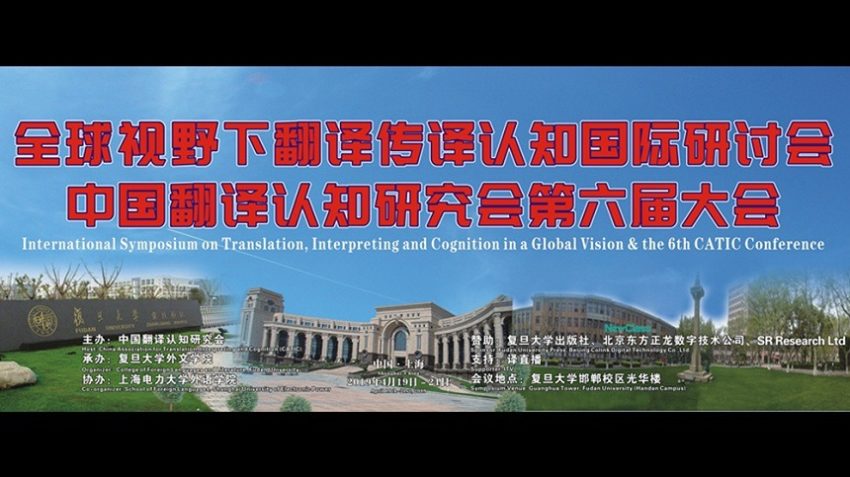
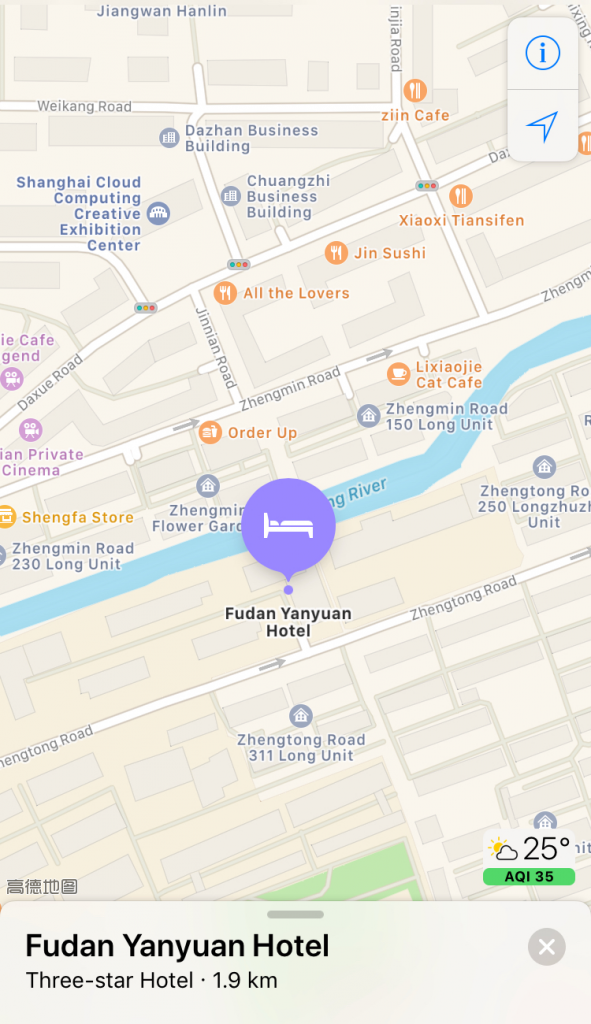

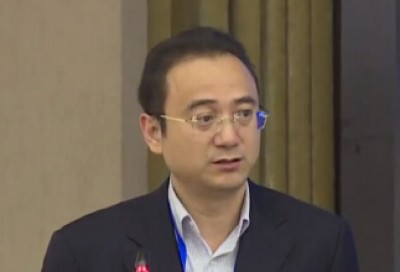
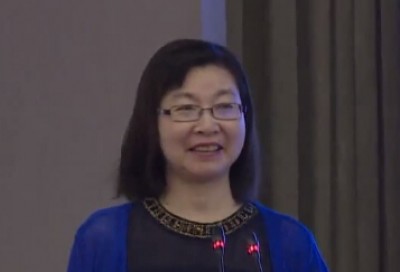
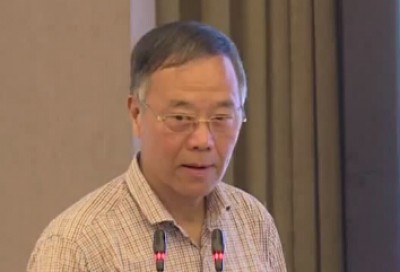
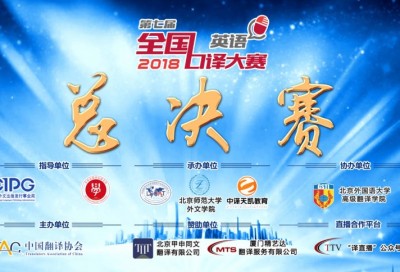

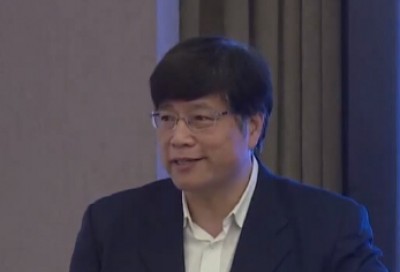

华译教育祝贺大会圆满成功!